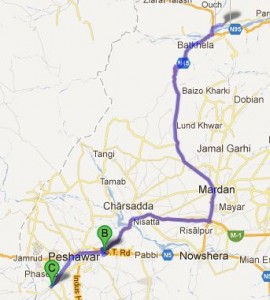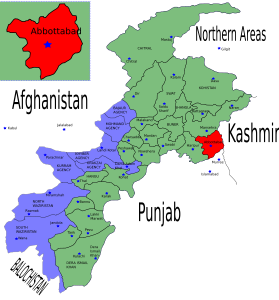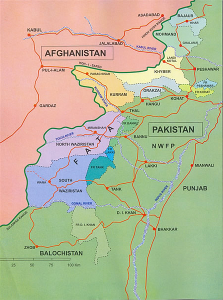Pakistan Still Searching for Long-Term Imprisonment Site for Afridi
After a “trial” that was strangely held in Bara, in the Khyber Agency of the Federally Administered Tribal Areas of Pakistan, Dr. Shakeel Afridi is now being held in the central jail in Peshawar in the Khyber Pakhtunkhwa province. Despite the fact that most were under the belief that Afridi was being tried on treason charges for his cooperation with the CIA in developing intelligence that lead to the killing of Osama bin Laden, we learned after the trial that he had in fact been convicted of aiding the Lashkar-e-Islam terrorist group. The actions for which he was convicted do appear to have taken place with the Khyber Agency, providing at least a justification for the trial’s venue.
As Time reported, there is concern for Afridi’s safety in the Peshawar jail:
Meanwhile, there is concern about Afridi’s safety. In a phone interview with TIME, Mohammand of the lawyers forum explains that Afridi is being kept in complete isolation and has yet to speak to anyone — including his legal counsel or family. “We actually have no idea where he is. He could be in jail; he could be in a foreign country; he could be anywhere.”
It is most likely, however, that Afridi is being held in Peshawar’s central jail. “We have requested the federal government to move Dr. Shakeel Afridi from Peshawar to another jail. We fear he could be attacked,” Mian Iftikhar Hussain, information minister for the Khyber-Pakhtunkhwa province, told journalists on May 30. The Peshawar jail has more than 250 prisoners incarcerated on terror charges. According to Hussain, these “diehard militants” could attack Afridi.
Shaukat Qadir, a retired brigadier and columnist who has been provided unrivaled access to the Army’s Abbottabad files, agrees that the government would be unable to secure Afridi for very long: “There are enough al-Qaeda sympathizers in Pakistan that he will never be safe here.”
We learn today from the Express Tribune that Pakistan’s federal government has asked the Punjab provincial government to house Afridi in their Adiala jail but they have refused:
The Punjab government has refused to accommodate Dr Shakil Afridi at the Adiala Jail saying the province already has its fair share of law and order problems.
The federal government had requested Punjab’s provincial administration to house Dr Shakil Afridi, said to be responsible for divulging information on Osama Bin Laden’s whereabouts to the US. However, Khyber-Pakhtunkhwa’s information minister Mian Iftikhar Hussain said on Sunday that Punjab has turned down the request.
The article goes on to related further detail on the request to move Afridi out of Peshawar’s jail:
“Keeping Dr Afridi at the central prison in Peshawar is risky keeping in view the recent attack on Banu Jail. We cannot keep him here and that is why we wrote a letter to the interior ministry to shift Dr Afridi to Adiala Jail as soon as possible,” official sources earlier told The Express Tribune.
Recall that the attack on the jail in Banu was in April, when over 100 militants attacked the jail, with nearly 400 prisoners being freed, although the attackers seemed most interested in freeing a high-profile militant who was being held for an assassination attempt against former president Pervez Musharraf. Note from this article about some of the Banu prisoners returning to jail voluntarily and some being recaptured that the photo shows us that jails in Pakistan are quite different from those here in the US. If Afridi is housed with prisoners loyal to al Qaeda, he could indeed be subject to attack.
It will be very interesting to see how Pakistan’s federal government responds to the refusal from the Punjab government and what their next step will be in seeking a place in which Afridi can serve his sentence.



